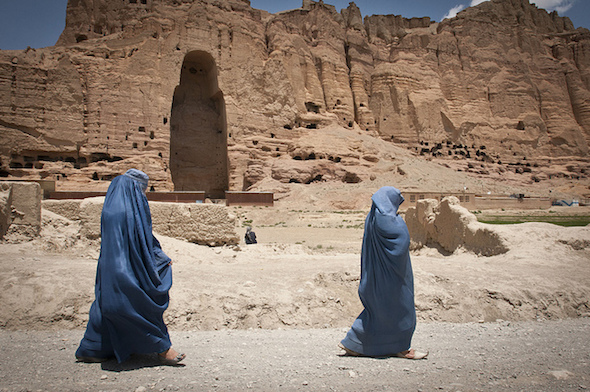AFGHANISTAN – “BAAD” FORCED MARRIAGES – RURAL AFGHAN GIRLS CONTINUE TO BE VICTIMS TO SETTLE FAMILY FEUDS
baad is a criminal offense under the Afghan Penal Code, the law only protects
widows and women above the age of 18 – cold comfort for the high number of
adolescent women who are hurt and endangered by the practice.

Her voice trembles as she recalls the day she entered a form of slavery. “I was playing outside, oblivious and innocent, when my mother suddenly called me into the house, crying hysterically,” Spogmai tells me. “She made me change into my best set of clothes and then took me to my neighbors and gave me away.”
Her new husband raped her on a daily basis, she says, and she endured torture and beatings from his family. She has lived in such captivity for 24 years. She agreed to speak to me on the condition that we protect her identity. Spogmai is not her real name.
The brutal Afghan custom of baad allows women and girls to be given, like property, to resolve disputes or clear debts. Human Rights Watch calls the semi-legal custom, which has no religious basis, one of Afghanistan’s “most abusive customary practices.”
Spogmai, who is now 36, and I meet in Ghazni Province in the southeastern part of the country, in her in-laws’ home. Her husband is out. When we talk, I notice Spogmai’s long black hair is covered in dust from working all day in their yard, and her dress is in tatters.
Ghazni is extremely rural and volatile: the drive from Kabul took three hours on mostly unpaved roads. I donned the all-encasing burqa for reasons of security before driving deep into Taliban country, where traditions such as baad are more prevalent. A native of Ghazni myself, and a woman, I was not deemed a threat, and I was allowed into her home to speak to her.
When Spogmai was 8 years old, just “an innocent little angel with a loving family,” her father had a fight with their neighbors. He ended up throwing a stone at one of them, killing her instantly. The dead woman’s husband would become Spogmai’s husband, as part of the baad arrangement.
At that time, the country was engulfed in a war between the Soviet Union’s Red Army and mujahideen fighters, and shortly afterward Spogmai’s family fled to Pakistan, where they lived as refugees. Life in Pakistan was hard, however, and they struggled to make ends meet. After returning to their village in Ghazni, the neighbors wanted to avenge the death of their relative, and threatened Spogmai’s father with death or jail. Deemed too old to face prison, the two families sought guidance from the local Jirga, a council composed of tribal elders that usually rules in favor of men. The Jirga, trying to reduce further bloodshed, decided that Spogmai should be handed over to the family as compensation for the killing.
Though baad is a criminal offense under the Afghan Penal Code, the law only protects widows and women above the age of 18 – cold comfort for the high number of adolescent women who are hurt and endangered by the practice. Despite being partially criminalized for almost 40 years, Human Rights Watch found through interviews that many women and Jirga members were not even aware of the law. A study by Afghanistan’s Women and Children Legal Research Foundation found that just over 10 percent of marriages in the country result from baad.
“When my mother found out that I was being tortured and beaten she went to all the homes of the Jirga council members to plead for me, but no one was ready to help or stop them from this violence,” Spogmai says, between sobs. She whispers most of her words into my ear, afraid that her in-laws will hear.
In addition to being raped and beaten, she was expected to feed her new husband’s family, who were the children of the woman her own father had killed. The children blamed her for the killing of their mother, and she says they decided to turn her life into a “living hell.” She also gave birth to three daughters and two sons of her own.
Women who are subjected to baad “are exchanged as commodities,” the WCLRF says. “Even their existence as human beings has been ignored,” the WCLRF says.
Afghan and international human rights groups alike say the justice system needs to become more accessible to women, and that it must extend its reach to rural areas. Afghan female parliamentarians have joined them in calling on the government to enforce the 2009 Law on the Elimination of Violence Against Women, or EVAW, which provides women with greater protection and would stamp out baad. Violence against women in Afghan is rarely prosecuted. Civil society and women’s rights groups are still reeling from the March 2015 murder of a 27-year-old woman in broad daylight in central Kabul, by a mob of men who falsely accused her of burning the Koran. The brutal killing of Farkhunda – and the disappointing legal process that followed – became a turning point in Afghan women’s battle for better rights, and called into question the government’s real intentions when it comes to protecting the country’s women from violence.
Woefully, stories like Spogmai’s are common across the country. “They blamed me for their mother’s death and beat me from the moment I set foot into their house.”


